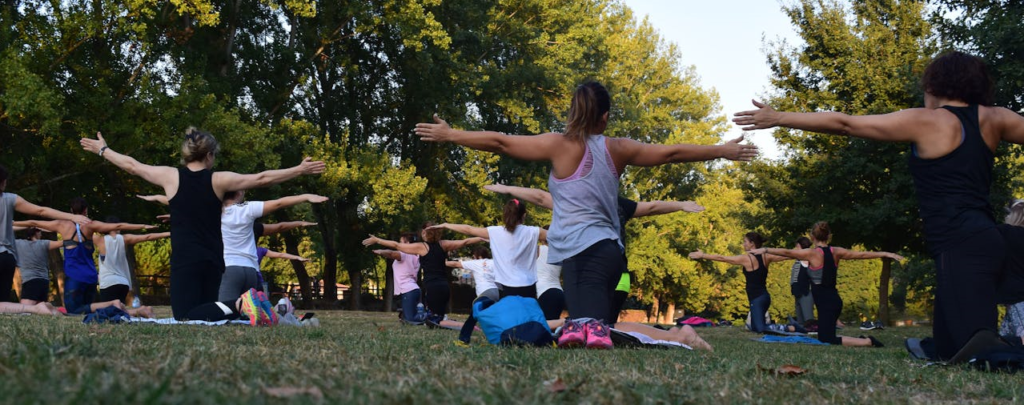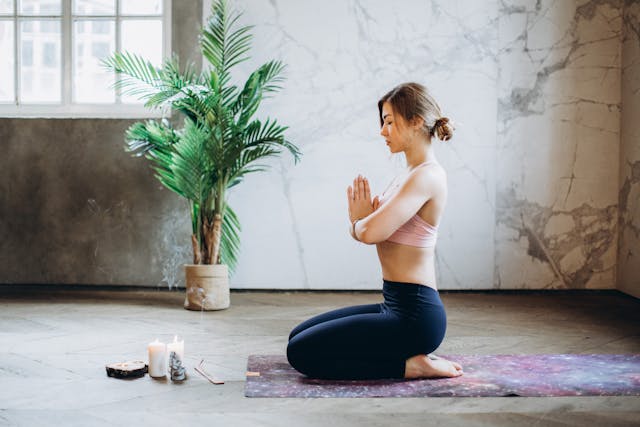Yoga can help calm you down
Stress isn’t just a mental game; it’s something our entire body feels. When we’re stressed, our body releases hormones like cortisol and adrenaline. These are handy in emergencies—like if you need to run from a bear—but not so much when you’re sitting at your desk. This physical response can lead to symptoms like headaches, tension, and even digestion problems.
Our mind, too, plays a significant role in how we experience stress. Negative thoughts, constant worry, and anxiety amplify our stress levels. It’s a vicious cycle where stress affects our mind, and in turn, our mind affects our stress levels. Breaking this cycle is crucial for maintaining mental health.
This is where yoga steps in. Yoga isn’t just about twisting your body into a pretzel; it’s a holistic practice that combines physical postures, breath control, and meditation. These elements work together to calm both body and mind, reducing stress and promoting overall well-being.

The Physiological benefits of yoga
Yoga is often touted for its physical benefits, but it’s the psychological perks that truly shine. One of yoga’s core principles is mindfulness, which encourages you to stay present in the moment. This practice helps quiet the constant chatter in your mind, allowing you to focus on the here and now.
Practicing yoga regularly can increase your self-awareness. You begin to notice how stress affects your body and mind, making it easier to identify triggers and implement coping strategies. This heightened awareness is a powerful tool in managing stress and enhancing mental clarity.
Another psychological benefit is the reduction of anxiety. Yoga promotes relaxation by activating the parasympathetic nervous system, which is responsible for rest and digestion. With regular practice, you’ll find your anxiety levels decreasing, leading to a more balanced and peaceful state of mind.

How to Use Yoga to Improve Your Mental Health
Starting yoga might seem daunting, but with a few simple steps, you can incorporate it into your daily routine. First, set aside a specific time each day for your practice. Whether it’s in the morning to start your day with peace or in the evening to unwind, consistency is key.
Choose a quiet space where you won’t be disturbed. This will help you focus and get the most out of your practice. Remember, yoga is as much about mental focus as it is about physical movement.
If you’re new to yoga, consider beginning with guided sessions. There are numerous online resources and videos that cater to different skill levels. Following a guided session can provide structure and ensure you’re practicing safely and effectively.
Other Blogs
Services Offered




6 Mental Health Benefits of Yoga
Navigating the intricate dynamics of co-parenting can often feel like walking a tightrope, especially when different parenting styles and conflicts come into play. However, with patience, communication, and mutual respect, these challenges can be transformed into opportunities for growth and understanding. By approaching each disagreement with an open mind and a focus on the well-being of your child, you can find common ground and create a harmonious environment. Effective co-parenting requires setting clear boundaries, consistent routines, and fostering a cooperative spirit. Remember, the ultimate goal is to ensure that your child feels loved and secure, regardless of the differences between the parental units.
1. Reduces Symptoms of Depression
Yoga has been shown to decrease symptoms of depression. The combination of physical movement, controlled breathing, and meditation increases serotonin levels, which can improve mood and create a sense of happiness.
2. Enhances Emotional Regulation
With regular practice, yoga enhances your ability to regulate emotions. It teaches you to pause and respond calmly rather than react impulsively. This skill is invaluable in maintaining healthy relationships and personal well-being.
3. Boost Self Esteem
Engaging in yoga promotes self-acceptance. It encourages you to appreciate your body and mind as they are, fostering a sense of gratitude and self-worth. This boost in self-esteem can positively impact every aspect of your life.
4. Improves Concentration and Focus
Yoga is a powerful tool for improving concentration. By training your mind to focus on the present, you can carry this skill into your daily tasks, enhancing productivity and efficiency.
5. Increases Relation
The relaxation techniques in yoga, such as deep breathing and meditation, reduce tension and promote relaxation. You’ll find yourself feeling more calm and content, even in the face of life’s challenges.
6. Provides a Sense of Community
Joining a yoga class or community can provide social support and a sense of belonging. Connecting with others who share similar goals can be both motivating and rewarding, enhancing your overall mental health.
Calm Your Mind Change Your Health
Calmness is a powerful state of being, one that can transform your life in unexpected ways. When your mind is calm, you’re better equipped to handle stress, make rational decisions, and enjoy life to the fullest. Yoga provides the tools needed to cultivate this calmness.
By incorporating yoga into your daily routine, you’re just investing in physical health; you’re nurturing your mind and spirit. Whether you’re seeking relief from stress, looking to improve mental clarity, or simply wanting to add tranquility to your life, yoga offers something for everyone.
Now that you’ve discovered the mental health benefits of yoga, it’s time to take action. Start small. Try a few poses, focus on your breathing, and gradually build your practice. Remember, yoga is a personal journey, and it’s important to find what works best for you.
Yoga Classes Coming Soon
I am a Registered Yoga Teacher (RYT) with Yoga Alliance, which acknowledges completing a yoga teacher training program with Registered Yoga School (RYS).
Registry Number ID: 439796
This gives me the expertise to apply yoga practices and breathe work to advance mindfulness, meditation, and connection to the body within therapy sessions.

I’m passionate about bringing harmony, peace, and joy back to couples
Shifting from parenting under the same roof to separated or divorced parents can be tough

Going to counseling can strengthen, or even save, your relationship. I urge people not to wait


